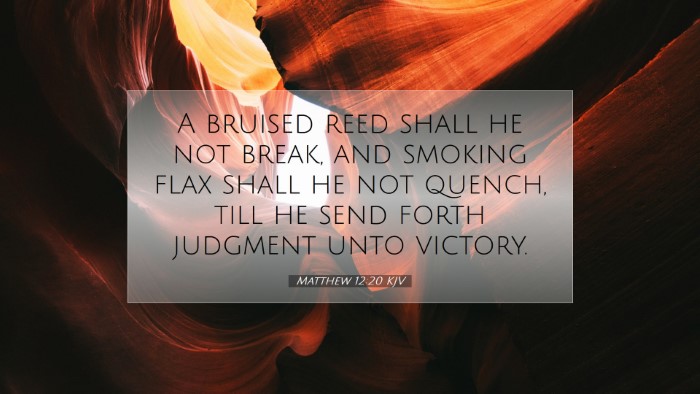Commentary on Matthew 12:20
Bible Verse: "A bruised reed shall he not break, and smoking flax shall he not quench, till he send forth judgment unto victory."
Introduction
This verse from the Gospel of Matthew draws upon themes of gentleness, compassion, and ultimate victory. It highlights the character of Jesus Christ, emphasizing His tenderness towards the weak and His commitment to justice. The imagery of the bruised reed and smoking flax serves to illustrate Christ’s approach to those who are spiritually fragile or in a state of vulnerability.
Exegesis and Interpretation
Matthew 12:20 is a citation from Isaiah 42:3, which serves to link the ministry of Jesus with prophetic expectations of the Messiah. This connection is critical for understanding both the identity of Jesus and His mission.
1. The Bruised Reed
Matthew Henry's Commentary: A "bruised reed" signifies someone who is weak or broken, lacking strength or hope. In ancient times, reeds were used for various purposes, including writing and measuring, but a bruised one was rendered nearly useless. Henry highlights that Jesus does not break the bruised reed; instead, His mission is restorative, working to heal and uplift those who are downtrodden.
Albert Barnes adds: The bruised reed represents the of Israel or any believer dealing with sin and weariness. Christ does not cast away the weak but seeks to restore them, reinforcing the nurturing nature of His ministry. He bears their burdens and offers healing rather than condemnation.
Adam Clarke expands on this theme: He indicates that the "bruised reed" could also be a metaphor for the moral state of sinners. Those who feel crushed by guilt or struggling in their faith are not beyond hope. Jesus embodies mercy, patiently guiding such individuals towards redemption rather than judgment.
2. The Smoking Flax
Matthew Henry's Interpretation: The "smoking flax" suggests a fading flame; it is a poignant symbol of a faith that is dim and nearly extinguished. Henry emphasizes that Jesus does not quench the smoking flax, indicating His care for even the faintest sparks of faith. This reflects His unwillingness to snuff out the slightest hope.
Albert Barnes notes: The smoking flax represents a soul that is close to spiritual death or despair. Barnes stresses that Christ encourages rather than extinguishes the trembling, flickering faith of His followers, providing assurance that even in doubt, His light can be rekindled.
Adam Clarke adds: Clarke suggests that the image of smoking flax is a representation of those who are almost extinguished in their faith or life struggles. Here, Christ's role is one of encouragement—offering either a means to fan the flames of faith back to life or a promise of continued presence and support during dark times.
Theological Implications
Matthew 12:20 offers profound theological truths that are essential for pastoral care, evangelism, and personal faith. The gentle nature of Christ expressed in this verse serves as a model for ministry.
1. Christ's Compassion
Henry's Perspective: The overarching theme is the compassion of Jesus towards the weak, emphasizing His willingness to engage with those who feel marginalized and broken. Pastoral ministry should mirror this compassion, seeking to uplift rather than condemn.
2. Hope for the Despairing
Barnes highlights: The promise of restoration is critical for believers who struggle with despair. This verse is often a source of comfort, reminding believers that even in their weakest moments, they are not abandoned.
3. The Role of the Church
Clarke concludes: The church is called to emulate Christ’s methodology by nurturing the broken and encouraging those whose faith is flickering. The body of Christ is to act as an agent of healing by providing a safe space for the bruised and smoking.
Conclusion
Matthew 12:20 encapsulates the essence of Christ's mission: to bring restoration and hope. This verse lays down a foundation for understanding the tenderness with which Jesus approaches humanity, especially the marginalized and suffering. The insights provided by scholars such as Matthew Henry, Albert Barnes, and Adam Clarke illustrate the profound implications for the church and individual believers as they seek to live out a faith characterized by gentleness and compassion.
Reflections for Pastors and Scholars
- Pastoral Application: How can you incorporate the message of gentleness and compassion in your ministry? Consider specific examples of how you will support those who are "bruised" or "smoking."
- Theological Study: Reflect on the attributes of God displayed in Christ's compassion. How does this inform your understanding of God's nature?
- Personal Reflection: In moments of personal struggle, how do you perceive Jesus' approach towards you? Take time to meditate on the gentleness He exhibits.


